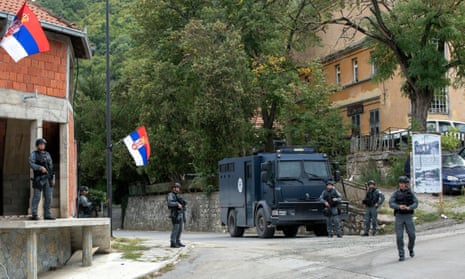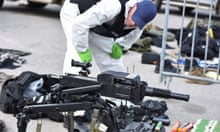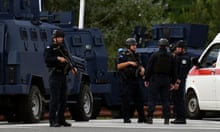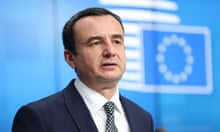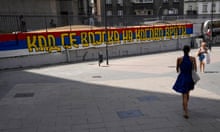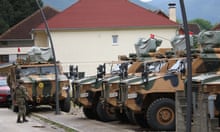Kosovo has accused Serbia of being behind a paramilitary group which ambushed a police patrol and clashed with Kosovan forces on Sunday.
The authorities in Pristina displayed an array of modern weaponry they said the group was using, including two Serbian-made armoured cars and a grenade launcher, alongside a document allegedly showing the grenade launcher, made by the Zastava arms company, had been supplied by the Serbian army.
The Kosovan government also claimed that the group’s leader was a prominent Kosovo Serb politician loyal to the Serbian president, Aleksandar Vučić, and that one of three paramilitary fighters killed on Sunday was a former bodyguard of Aleksandar Vulin, the Serbian intelligence chief sanctioned by the US in July for corruption.
“This group came from Serbia, they are trained in Serbia, financed by them and also equipped by the army of Serbia and its police,” Xhelal Sveçla, the Kosovan interior minister, told the Guardian.
“Some of the weapons were taken from the warehouses of the army and handed over to terrorists who came into Kosovo from Serbia.”
Sveçla said his ministry had shared the evidence with western embassies and agencies.
“What they wanted to do is to capture territory of Kosovo, and to open a new channel of communication, a new road from Serbia to Kosovo,” he said, adding that the ultimate aim was the partition of the country.
The Serbian government has denied involvement with the armed group, but held an official day of mourning for the three dead.
Vučić has sought to justify their actions by falsely claiming, in a meeting with the Russian ambassador to Belgrade, that the Kosovan government was carrying out ethnic cleansing.
Kosovo alleges that the group was led by Milan Radoičić, the deputy leader of the Belgrade-backed Serb List party, which dominates politics in the four Serb-majority municipalities in northern Kosovo.
Sveçla said his country’s intelligence service believed Radoičić, who has been sanctioned by the US and UK, had been wounded and was recovering in the main military hospital in Belgrade.
The claim could not be independently verified. Radoičić has not made a public statement but Serbia’s foreign minister, Ivica Dačić, claimed a video purporting to show Radoičić among the paramilitaries was a “fraud”.
The clash happened at a time when EU-brokered talks aimed at normalising relations between the two countries are stalled, with Vučić vowing he will never recognise Kosovo, and the Kosovan government consequently refusing to establish a semi-autonomous association of Serb municipalities.
The US has been backing the talks and has until now sided with Europe for putting most of the blame for their failure on the Kosovan prime minister, Albin Kurti. But the Biden administration is investigating Belgrade’s involvement in the paramilitary unit, and trying to discover its mission.
If Vučić is found to have been involved, it could change the approach taken by the US and the EU to negotiations, which have been criticised by legislators on both sides of the Atlantic as being biased towards Belgrade. It could also lead to sanctions on Serbia.
“It is increasingly clear that there was a scenario at work to provoke a conflict so that the Serbian army would then enter to protect the Serbian people in the north and thus implement the division of Kosovo,” said Sonja Biserko, the president of the Helsinki Committee for Human Rights in Serbia.
“This operation, regardless of who is directly responsible for it in Belgrade, has crossed a red line that the west cannot tolerate,” Biserko said. “This situation was not provoked by Kurti, as most in Belgrade comment. On the contrary, he showed maturity and the Kosovo police showed professionalism.”
after newsletter promotion
In a briefing paper for the EU, the Kosovan government said “a group of dozens of masked gunmen opened fire on a routine patrol by police officers” on 24 September in the village of Banjska, also known as Banjskë, near the Serbian border.
One Kosovan police officer was killed, as well as three members of the paramilitary group, and several others were injured in the clashes. The Serb group then withdrew in armoured cars to a monastery near the village, leading to a standoff.
Before Kosovan police were able to take control of the monastery, Sveçla said, some of the paramilitary group were able to slip away and cross into Serbia.
The US secretary of state, Antony Blinken, condemned the attack on the Kosovan police and said: “The perpetrators of this crime must be held accountable via a transparent investigative process.
“We call on the governments of Kosovo and Serbia to refrain from any actions or rhetoric which could further inflame tensions.”
Blinken urged a “return to the EU-facilitated dialogue”.
Edward P Joseph, a former deputy head of mission in Kosovo of the Organization for Security and Co-operation in Europe, said that if Belgrade was behind the paramilitary group, the US would have to rethink its approach to the region.
“The point is that the calls for dialogue are empty now that the entire US strategy – to cultivate Vučić’s Serbia as a ‘partner’ – has blown up,” said Joseph, now a senior fellow at the Johns Hopkins University school of advanced international studies in Washington.
“Vučić’s denials of knowledge are about as credible as the illusionary US policy towards Serbia.”
Shpend Ahmeti, an independent Kosovan politician and former mayor of Pristina, said: “It is clear that the next days and weeks will be tense. This is not over.
“The dead militia were treated as heroes and it means that this is a call for more ‘heroes’ but it is also certain that now their capabilities have been decapitated.”
